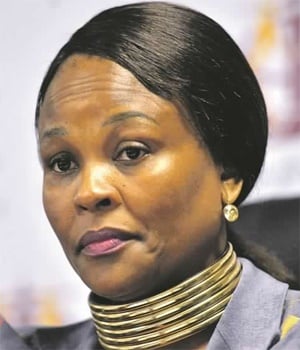Legal experts have slammed the Public Protector's announcement that she has found that a tweet about colonialism by Western Cape Premier Helen Zille was in violation of the Constitution.
In her report on the matter, Public Protector Busisiwe Mkhwebane said that Zille's conduct was tantamount to improper conduct in terms of the Constitution, as well as violating the Executive Ethics Code.
In 2017, Zille tweeted: "For those claiming legacy of colonialism was ONLY negative, think of our independent judiciary, transport infrastructure etc."
"It cannot be said that the Premier's tweet sought to show concern and respect for those who were victims of apartheid and colonialism," Mkhwebane said in an executive summary.
But legal experts are unconvinced that Mkhwebane applied the law correctly in this instance, both in terms of her jurisdiction to make a decision over the matter and her application of the Bill of Rights and Executive Ethics Code to make her finding.
Mkhwebane invoked Section 10 of the Bill of Rights (the right to human dignity) and Section 16(2)(b) of the Bill of Rights (dealing with speech not protected by the Constitution) to justify her decision. With regards to this, she said that the Bill of Rights "prohibits statements which could provoke a certain public reaction, capable of stirring up racial violence. The reaction of the South African public towards the Premier’s tweets is indicative of the likelihood stirring up violence based on race and therefore in contravention of Section 16(2)(b) of the Constitution".
According to Phephelaphi Dube, director of the Centre for Constitutional Rights, Mkhwebane's interpretation of the Bill of Rights here is incorrect.
"While many South Africans were offended by Zille’s tweets, the tweets certainly do not constitute the form of hate speech which the Constitution proscribes in Section 16 of the Bill of Rights," she says.
"In terms of the Constitution and the Public Protector Act, the Public Protector is tasked with investigating improper conduct, in both state affairs and public administration. The Human Rights Commission in this regard is better suited to investigate alleged infringements of the Bill of Rights.
Legal expert Professor Pierre de Vos writes in his legal blog Constitutionally Speaking that the Constitution does not give the Public Protector the power to investigate breaches of provisions of the Bill of Rights.
"[N]either Section 182(1) of the Constitution, nor Section 6(4) and (5) of the Public Protector Act, nor the Executive Members Ethics Act bestow power on the Public Protector to investigate alleged infringements of the Bill of Rights. These sections do bestow broad powers on the Public Protector to investigate corruption, maladministration, abuse or unjustifiable exercise of power, improper or unlawful enrichment relating to the affairs of state, and breaches of the Executive Members Ethics Code," he writes.
'Does not have the power to make such a ruling'
"No Public Protector has ever attempted to rule that a member of the executive has breached a constitutional right and there is a good reason for this: the Public Protector does not have the power to make such a ruling as such investigations are beyond the jurisdiction of her office."
Dube says Mkhwebane also misapplied the Executive Ethics Code.
"The Public Protector relied upon the general standards of the Executive Ethics Code, which requires members to act in good faith and in the interests of good governance. As such, it would appear as if the Executive Ethics Code is not directly applicable and hence she misapplied the law," she says.
Section 2.1(d) of the code states that members of the Executive must, to the satisfaction of the president or the premier, act in all respects in a manner that is consistent with the integrity of their office or the government. Section 2.3(c) prohibits members of the executive from acting in a way that is inconsistent with their position.
Mkhwebane found that Zille's tweets were in breach of these sections because they were offensive and insensitive to a section of South Africa’s population.
According to De Vos, it is a stretch to find that a member of the executive who tweets something that is offensive or insensitive to a section of the population is in breach of the Executive Members Ethics Code.
According to Dube, Zille’s only option is to take the Public Protector’s findings on review and have a court overturn the findings.
